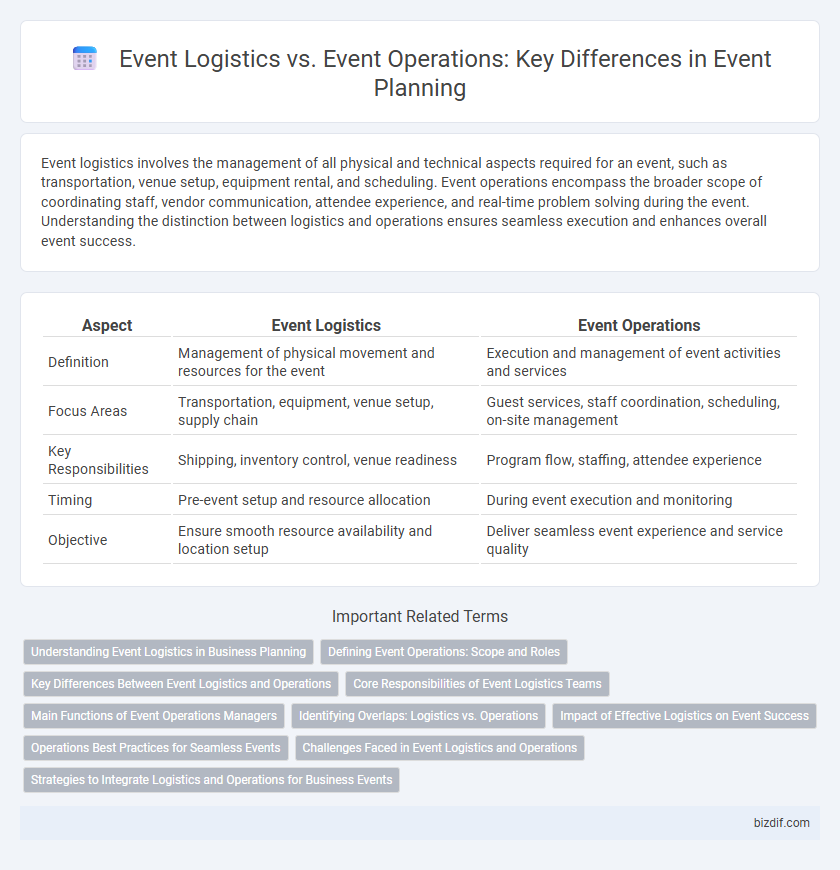Event logistics involves the management of all physical and technical aspects required for an event, such as transportation, venue setup, equipment rental, and scheduling. Event operations encompass the broader scope of coordinating staff, vendor communication, attendee experience, and real-time problem solving during the event. Understanding the distinction between logistics and operations ensures seamless execution and enhances overall event success.
Table of Comparison
| Aspect | Event Logistics | Event Operations |
|---|---|---|
| Definition | Management of physical movement and resources for the event | Execution and management of event activities and services |
| Focus Areas | Transportation, equipment, venue setup, supply chain | Guest services, staff coordination, scheduling, on-site management |
| Key Responsibilities | Shipping, inventory control, venue readiness | Program flow, staffing, attendee experience |
| Timing | Pre-event setup and resource allocation | During event execution and monitoring |
| Objective | Ensure smooth resource availability and location setup | Deliver seamless event experience and service quality |
Understanding Event Logistics in Business Planning
Event logistics in business planning focuses on the detailed coordination of venue selection, transportation, equipment setup, and supplier management to ensure a seamless event experience. It involves scheduling, inventory control, and real-time problem-solving to align with strategic goals and budget constraints. Efficient event logistics directly impact operational success by minimizing risks and optimizing resource allocation during the event lifecycle.
Defining Event Operations: Scope and Roles
Event operations encompass the comprehensive management of all activities ensuring an event's seamless execution, including venue setup, vendor coordination, staff supervision, and real-time problem-solving. This scope extends beyond logistics by integrating on-site team leadership, security oversight, and attendee experience management. Clearly defined roles within event operations optimize workflow efficiency and contribute significantly to achieving event objectives.
Key Differences Between Event Logistics and Operations
Event logistics centers on the detailed coordination of resources including venue management, transportation, and equipment setup, ensuring all physical elements align smoothly. Event operations focus on overseeing the live execution, managing staff roles, ticketing, security, and attendee experience from start to finish. The key difference lies in logistics handling the preparatory infrastructure while operations manage real-time event flow and problem-solving.
Core Responsibilities of Event Logistics Teams
Event logistics teams primarily handle the coordination of physical resources, including venue management, transportation, equipment setup, and ensuring timely delivery of materials. Their core responsibilities also encompass managing inventory, overseeing vendor contracts, and facilitating on-site registration and attendee flow. This logistical groundwork ensures seamless execution and supports the broader event operations by addressing the practical aspects essential for event success.
Main Functions of Event Operations Managers
Event operations managers focus on coordinating on-site activities, managing vendor relationships, and ensuring smooth execution of the event schedule. Their main functions include overseeing staff assignments, troubleshooting real-time issues, and maintaining compliance with safety regulations. Effective event operations management enhances attendee experience and optimizes resource utilization during the event.
Identifying Overlaps: Logistics vs. Operations
Event logistics and event operations often overlap in managing venue setup, resource allocation, and vendor coordination to ensure seamless event execution. Both functions involve scheduling deliveries, supervising on-site activities, and troubleshooting issues in real-time, highlighting shared responsibilities in time-sensitive event environments. Clear delineation of logistics handling transportation and equipment versus operations managing staff and attendee flow optimizes efficiency and reduces redundancy.
Impact of Effective Logistics on Event Success
Effective event logistics streamline transportation, equipment setup, and supply management, minimizing delays and ensuring resources are where they need to be. This coordination enhances the overall flow of event operations, boosting attendee satisfaction and optimizing staff performance. Efficient logistics directly contribute to seamless execution, reducing costs and increasing the likelihood of event success.
Operations Best Practices for Seamless Events
Event operations center on executing detailed event plans, managing staff coordination, and ensuring smooth on-site experiences, while event logistics focus on the movement and placement of resources and materials. Best practices for seamless events involve real-time communication systems, comprehensive contingency plans, and precise task delegation to maintain flow and address issues promptly. Leveraging technology such as event management software enhances operational efficiency by tracking schedules, resources, and personnel activities effectively.
Challenges Faced in Event Logistics and Operations
Event logistics faces challenges including coordinating transportation, managing inventory, and ensuring timely delivery of materials to prevent disruptions. Event operations encounter difficulties streamlining on-site activities, handling technical issues, and maintaining staff communication for efficient execution. Both areas require precise coordination and contingency planning to address unexpected obstacles effectively.
Strategies to Integrate Logistics and Operations for Business Events
Effective integration of event logistics and operations hinges on synchronized planning that aligns resource allocation, vendor coordination, and timeline management to ensure seamless execution. Leveraging real-time communication tools and centralized platforms enhances collaboration between logistics teams and operations managers, optimizing responsiveness and issue resolution during business events. Implementing data-driven strategies to monitor workflows and participant engagement facilitates continuous improvement, maximizing overall event success and stakeholder satisfaction.
Event logistics vs Event operations Infographic

 bizdif.com
bizdif.com